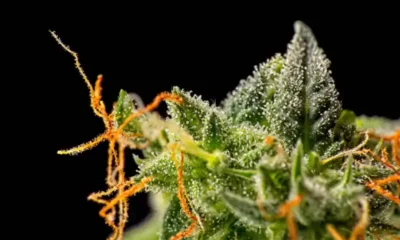Connect with us
Published
5 months agoon

Florida voters may get the chance to vote on a cannabis legalization initiative next year, depending on the outcome of an ongoing legal challenge. And based on the results of a new poll, the odds of further cannabis reform are looking strong for the Sunshine State.
The University of North Florida (UNF) conducted the poll to gauge voter stances on a number of issues, including the legalization of recreational cannabis. Ultimately, it found that 67% of surveyed voters backed the current legalization proposal, beyond the state’s 60% minimum voting threshold to pass ballot measures.
Additionally, the results showed majority support across every political, gender, race and age demographic reported in the survey.
Democrats showed the most support, at 78%, compared to Republicans at 55% and non-partisans/other voters at 69%. Younger demographics were also strongly supportive of the reform measure, with 86% expressing approval, though even the 65+ demographic said they backed the legalization initiative.
Of the 716 registered voters who completed surveys, 277 were completed via telephone and 439 online. Interviews were conducted from Nov. 6-26, reflecting a margin of error of +/-4.37 percentage points. The 10 designated media market areas in Florida were stratified into 18 different strata according to geography and urbanicity to ensure a representative sample.
The poll posed the specific details of the proposed amendment that would appear on the 2024 ballot, unlike previous surveys from the University’s Public Opinion Research Lab (PORL) which simply asked whether or not voters supported or opposed the legalization of cannabis, according to Dr. Michael Bender, PORL faculty director.
“Yet again, it looks like it has a good chance of passing, if the measure makes it through the
courts, and that is a very big ‘if’,” Bender said.
The Smart & Safe Florida (SSF) campaign’s legalization initiative was set to hit the 2024 ballot after supportives turned in nearly one million signatures, which were then certified by the state.
The initiative is currently in the throes of the Florida Supreme Court after Attorney General Ashley Moody (R) challenged it. Moody argued that the ballot measure is misleading, suggesting that the summary makes it unclear that cannabis would remain federally illegal even if the state moved to legalize it.
“…Voters need clear guidance before being asked to lift state-law penalties for the possession of a substance that would subject users to devastating criminal liability under federal law. And the rampant misinformation in the press and being peddled by the sponsor of this initiative about its effects makes clarity all the more pivotal,” Moody said over the summer.
In early November, the Court held oral arguments in the case.
SSF filed a brief with the Florida Supreme Court against Moody, asking the Supreme Court to “reject these misguided efforts to jettison established legal rules in service of a thinly veiled policy agenda,” and to confirm that SSF’s initiative “satisfies the legal requirements to be placed on the ballot.”
In 2022, Moody similarly argued that a 2022 legalization measure had misleading language. In that instance, the issue was with an amendment “limiting” personal use, namely arguing that the proposal does not actually do so and that it could be seen as putting a limit on cannabis consumption. The Supreme Court ultimately invalidated the proposal.
Moody also accused Trulieve—which has contributed more than $39 million to the campaign to date—of supporting the measure to obtain a “monopolistic stranglehold” on Florida’s legal market.
The current initiative would alter the Florida state Constitution to allow medical cannabis companies to sell cannabis to adults over the age of 21. It also contains a provision allowing lawmakers to pave the path forward in approving additional businesses, though they would not be required to do so.
Adults over 21 would be able to legally purchase and possess up to one ounce cannabis, and of that total would be limited to five grams of cannabis concentrates. The initiative does not allow home cultivation for consumers, and it also leaves out equity provisions to provide relief to disenfranchised populations and those historically most impacted by the War on Drugs.
The UNF poll reflects the results of other polls similarly suggesting that Florida voters would be likely to approve a recreational cannabis initiative, should it appear on the ballot.
A University of South Florida and Florida Atlantic University poll published in September found that 60% of respondents approve of adult-use cannabis legalization in the state, with 83% approving of the state’s current medical cannabis program.


Despite City Efforts, Hemp Shops Posing as Dispensaries Prevail in Las Vegas


Cannabis Community, Investors React to DEA Decision To Reschedule


Georgia Governor Signs Bill Establishing Licensing Requirements To Grow Hemp


Study: Psilocybin Enhances Meditation


Ohio GOP Lawmakers Debate Adult-Use MJ Priorities, Eye June for Regulation Approval


Taylor Swift Puts Narcotics Into All of Her Songs on ‘The Tortured Poets Department’
